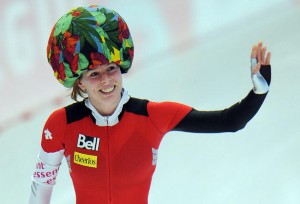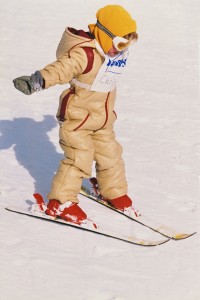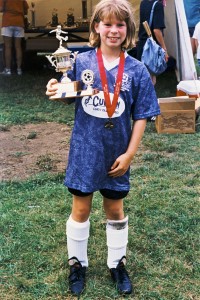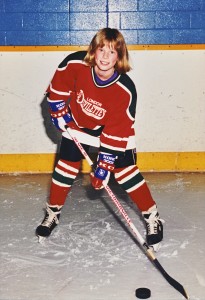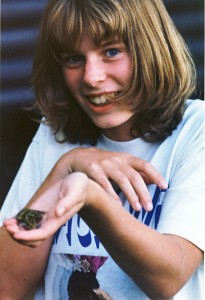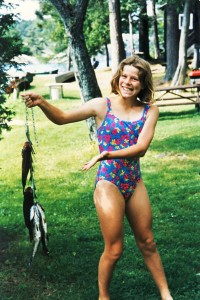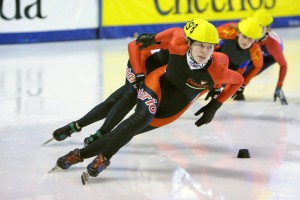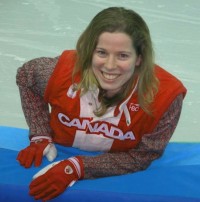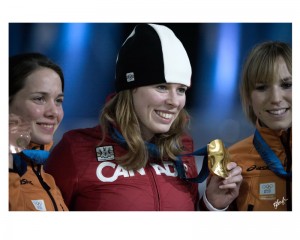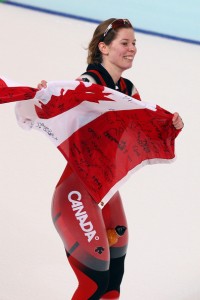Biography of Christine Nesbitt as remembered by her family, friends and neighbours
Pre-School Years
Christine Nesbitt was born May 17th, 1985, in Melbourne, Australia and at three months arrived in Canada. Growing up in London, Ontario, she developed an interest in outdoor activities, sports, music and art. On vacations to a cottage near Whitefish Falls, Ontario, the family canoed and portaged into little-visited lakes and waterways. During these periods Christine developed a strong interest in outdoor activities and became an avid fisherman.
In these early years she developed an interest in music. As a child she would relax by lying on the family room couch, doors closed, listening to Fantasia. Her interest in music grew to include classical, jazz, rhythm and blues, blues and punk rock. Her favourite singers include Otis Redding, Regina Spektor, Ella Fitzgerald and Sam Cooke. Louis Armstrong is her favourite trumpet and Chopin is her favourite composer.
The Competitive Instinct Develops
The family spent a year in Pinawa, Manitoba, where Christine began grade 1 by attending Pinawa Public School. She switched to Beausejour Public School and the French Immersion stream the same year. Her competitive spirit developed rapidly during this period, as was obvious on Pinawa’s outdoor rink where Christine competed with her brother and his friends, playing tag or pickup-hockey. Even then she had the speed and agility to challenge most of the older boys. She joined the Pinawa ‘squirts’ hockey team, which travelled from Pine Falls to Beausejour to play games. Her competitive streak was first evident on the outdoor ice of the Pinawa rink.
Primary School Years
Returning to London after a year in Pinawa, she attended Jeanne Sauvé Public School and played house-league hockey, soon qualifying for the girls’ competitive hockey team, the London Devilettes. It was a travel team playing in arenas from Toronto to Windsor.
She joined the school track and field team, and the cross-country team, winning numerous ribbons in city and surrounding county track meets. Although a good sprinter and distance runner, her strength was in the middle distances, where a combination of speed and endurance served her well.
A major event of her primary school years was the acquisition of a young dog, a beagle, which Christine named “Howi”, (ends with an ‘i” as she always emphasized). Not to be outdone, her brother decided the dog’s last name would be “Gordon”, after Gordie Howe. All were happy with the name.
Finding Her Sport
At 11 years old, Christine was tiring of hockey. She had noticed short-track speed skaters practising on an adjacent skating pad and was curious. Seeing her interest, her parents suggested that she try speed skating. They also cautioned that she could only play one competitive sport so a choice had to be made. At the age of 12 she commenced short track speed skating. She faced her first competition with trepidation, primarily because she was inexperienced, was skating in the lowest category and against much smaller and younger kids. Her quote was “I had better win!”. Her speed and endurance were immediately evident and she moved rapidly into the more competitive levels. She had found her sport!
Secondary School Years
Christine attended Sir Fredrick Banting Secondary School in London. It was a time of rapidly expanding musical interests. She was active in piano lessons and joined the school band, played trumpet for four years and lead trumpet during her last year. She also played trumpet in the jazz band and in a brass group. A guitar and a punk rock band occupied weekends when not skating. In grade 10 she wrote a classical piece in three parts, for submission to an Ontario Provincial competition. The piece, dedicated to her dog Howi, won second prize in the Province. She was interested in all aspects of music.
An Athlete Matures
As much as Christine loved music, speed skating was paramount, and success came quickly. Coached by a former speed skater Gerry Bos, an émigré from Holland, and Kristi Copeland, long dedicated to coaching young skaters of the London Speed Skating Club, Christine won meets at such a rate that in her first year her ranking did not keep pace with her accomplishments. By the end of the year, as a 12 year old, she was ranked 6th in Ontario among all female speed skaters.
Her second year was still more successful, ranking 4th in the province and was one of four female skaters selected to the Ontario Short Track Speedskating Team to compete in the Canada Winter Games in Corner Brook, Newfoundland. There, at age 13, she won her first national speed skating medal, silver in Team Relay.
At age 15 she became the Ontario Junior Speedskating Champion and held it until she switched to Long Track. The following two years saw her ranked as the top Ontario female short track speed skater (Junior or Senior), setting numerous provincial records, some of which still stand, and winning the award as Ontario’s fastest woman – two years running. Other achievements included receipt of the James Worrall Award and a bronze medal in the 2003 Canada Winter Games in Campbellton, New Brunswick. She graduated from High School as an Ontario Scholar, was accomplished in music, and was primed for competition at national and international levels in short track speed skating.
University and A Twist of Fate
Christine graduated from High School after grade 12. That was the year of the Ontario High School double cohort, where both grades 12 and 13 students graduated from High School in the same year; the Ontario Secondary School system had eliminated Grade 13 from the curriculum. She applied to McGill, Calgary and Ottawa Universities but desperately wanted to go to McGill so that she could train at the National Short Track Speed Skating Centre (Maurice Richard Arena, Montreal). Although her marks would have allowed her into McGill the previous and subsequent years, she was not accepted in the year of the double cohort.
Christine decided upon the University of Calgary (Engineering) and with the encouragement of coaches and parents switched to long track speed skating at the Calgary Oval, the National Long Track Speed Skating Centre for Canada. With this decision her fate as a short tracker was sealed and Christine had to find her way in a new sport and in a new academic environment.
A Long Track Speed Skater Emerges
A national speed skating coach, Marcel Lacroix took a chance and accepted Christine into his training team. After moving to Calgary, she commenced training in August 2003. It was a gruelling pace, training twice a day, 6 days a week as well as going to classes in the Engineering school. In August 2004 she switched to Geography to continue her schooling part time, as she found it very difficult to balance her Engineering while still skating. As with her earlier short track career, her development proceeded rapidly. She trained throughout 2003 and 2004.
One and one-half years after taking up the sport, Christine earned a spot on the Canadian National Team in January 2005 enabling her to compete in international World Cup competitions. Under the guidance of her coach, Marcel Lacroix, she skated in her first World Cup meet in January, 2005, and competed in her first World Championships (Single Distance Championships) in March of the same year.
The 2004-2005 Single Distance Championships at Inzell, Germany were her first World Championships, finishing 17th in both 1000m and 1500m distances. Partly on the strength of these results Christine won the Canadian long track “Rising Star Award” in the spring of 2005. Christine’s path was firmly set on long track speed skating at national and international competitions.
The Olympic Challenge
In the summer of 2005 and with only 3 months of World Cup competitions, Christine was determined to qualify for the Turin Winter Olympic speed skating team. It would be a huge challenge because there was an already well-established women’s team consisting of Clara Hughes, Cindy Klassen, Kristina Groves, Shannon Rempel, and Brittany Schussler.
Christine boldly stated her dream of becoming a member of the team in a letter to her parents in the spring of 2005, less than a year before the Olympics. She redoubled her training efforts, and in the 2005-06 World Cup season she won her first World Cup medal, a bronze in the 1500m at Kearns, Utah. This success was critical to securing a position on the Olympic Team. At the Canadian Olympic Trials she qualified for the Turin Olympic Team in the 1000m and 1500m events and Team Pursuit, finishing respectively,14th and 7th, and second (Olympic silver medal) in the Team Pursuit.
Christine learned much from the Turin Olympics, particularly the focus, dedication and determination needed to succeed. Clara Hughes, Cindy Klassen and Kristina Groves were superb role models and she learned her lessons well. The following four years saw Christine win many World Cup medals, numerous World Cup Championships, World Championships and Olympic medals. Her achievements were recognized by being selected the Canadian Female Athlete of the Year, thus receiving the The Velma Springstead Award (Canadian Sport Awards, True Sport Foundation) in 2009 .
In 2009 at the Richmond Oval she was crowned World Cup Champion at 1000 m. A year later, at the Vancouver Winter Olympics, and at the same venue, she won a Gold Medal at the 1000 m distance. The failure to win an Olympic Gold Medal in the Team Pursuit was a great disappointment and as a result the Olympic challenge is not entirely fulfilled. She awaits another chance to complete the challenge in the 2014 Winter Olympics in Sochi.
A Year To Remember: 2010-2011
Christine’s 2010 summer training period was very difficult on three counts, lack of motivation after the Olympics, personal issues and a broken elbow (hit by a car). Nevertheless she collected five gold medals at 1000 m, four at 1500 m races, 1 in Team Pursuit and 2 bronze medals in the 1500 m at World Cup events and ended the year as the 1500m World Cup champion and the World Cup runner-up in the 1000 m.
She entered the World Sprint Championships for the first time and won the two day event. The 1000 m race in which she set the Thialf Oval 1000 m track record (1:15.01) was probably her best ever race. Being crowned World Sprint Champion at Heerenveen was the highlight of her year.
At the Allround Championships in Calgary, Christine won the 500 m race in a personal best time of 37.72 sec and set a personal best time in the 3000 m event. It was not quite good enough and she ended the two-day event, where 500 m, 1500 m, 3000 m and 5000 m are skated, by placing second overall.
The skating calendar closed with the Single Distance Championships at Inzell. There she won two gold medals, one in Team Pursuit and one at the 1000 m distance, making her the World Champion at 1000m for the third successive year. Her 1000 m time was the fastest she has skated in Europe (1:14.84). This was by far her best year in speedskating.
2011-2012: A Tour de Force
The 2011-2012 year was one for the ages. Christine entered 5 of the 7 World Cup races at the 1000 m distance, went undefeated, and won every race by more than one-half a second, a huge margin for a sprint. In doing so she set the 1000m World Record at the Calgary Oval (1:12.68) and track records at four other ovals. In addition she received 3 gold medals and 2 silver medals in the five 1500 m races entered, and 3 gold medals in the Team Pursuit. She accumulated the most World Cup points for which she was crowned Women’s World Cup Champion for the year.
She shone at the 2012 World Championships winning gold at 1000m and 1500m and silver in the Team Pursuit. The World Sprint Championships brought her gold in both 1000 m races and she finished second overall. In the World Allround Championships she collected gold in the 500m and 1500m races and finished third overall.
Christine was awarded the highest honour in speed skating for her performances at 1000m – the Oscar Matisen Award for the best performance of the year – men or women.
2012-2013: The Year of Discomfort
The year brought mixed results, both with respect to skating and personally. She won gold in her first race of the season (1500m) but suffered a great disappointment in the 1000m, almost falling and finishing 10th in her signature race, the 1000m. The remainder of the season was similar, some good performances (setting the 1000m track record at Salt Lake City with the second fastest time ever skated) but finishing 4th in the 1000m at the World Championships. In all she won 5 World Cup gold, 3 silver and 3 bronze medals, and she won a bronze at the World Championships in the 1500m.
Although diagnosed just after the skating season, Christine had developed Celiac Disease and had suffered from it for about a year. It was a difficult period in that her digestive system had been unsettled throughout the season, with no known cause for the problem. It was a relief to find out the treatment was relatively simple — avoid gluten.



